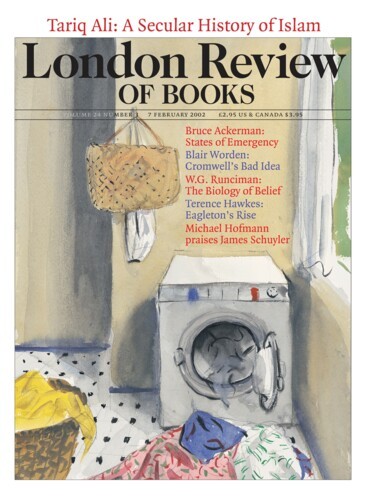The critics can be pushed only so far. Having fallen over themselves to praise John Bayley for Iris: A Memoir of Iris Murdoch, they were kind, rather, about Iris and The Friends. But now – and this even after Bayley’s appearance with Kate Winslet and Judi Dench on his arm at the première of Iris: The Movie – the cracks have begun to appear.
Writers have often been priggish about the cinema. ‘A kiss is love. A broken cup is jealousy. A grin is happiness,’ Virginia Woolf complained in 1926, and the feeling persists. Even the best images won’t do. The scene in Iris that everyone seems to like most has her in the late stages of Alzheimer’s, tearing blank pages from her notebook and pinning them to the beach with pebbles. It’s offered, and has duly been read, as a visual metaphor for an unspeakable loss – one of those moments when cinema aspires to the poetic. The film is full of such images: the blast of a Tube train and the mêlée of the platform stand in for Iris’s linguistic disorientation, her face refracted in a window-pane for her fragmented self. But the effect of such scenes, in the end, is to point up film’s difficulty in rendering a life ‘lived in the mind’.
That doesn’t stop it trying. Roles drawn from life in which artistic genius is crossed with profound illness are thought especially heroic (the Oscar nominations began with Cornel Wilde’s Chopin in 1945, and the most recent was for Emily Watson’s Jacqueline du Pré in 1999). Currently, Iris is sharing the plaudits with A Beautiful Mind, a portrayal of the Nobel Prize-winning mathematician, and schizophrenic, John Nash. All this despite the fact that it’s precisely at the point that movies try to convey genius, or ‘thought’ generally, for that matter, that their limits are most obviously, uncomfortably exposed.
It’s a familiar observation, repeated by Martin Amis in a recent review of Iris: where literature addresses the internal, cinema must always deal in the external. So, ‘romance’ in Iris is all jumpers and bicycles and giddy concupiscence; ‘cleverness’ is a scattering of easily digested aphorisms and supermarket musings about the ‘parts’ of ‘wholegrain’ mustard. It’s charming and embarrassing, silly and touching by turns; mildly, reassuringly affecting. Iris does all the things that movies do to move their viewers to tears, and the tears are part of what we pay for. They’re proof that what we’re experiencing is the ‘real thing’.
In the case of Iris, there seems to be a stronger push than usual, on the part of everyone concerned, for us to wish away the unhappy gap between movies and the ‘real thing’. For Kate Kellaway, who enjoyed the kind of intimacy with Iris and John that you yourself might if you’d written a feature on their kitchen for the Observer six years ago, the film is ‘uncanny’, ‘like a trick of memory’ – ‘there was Iris.’ Partly, this is simply to say ‘I knew her’: very few of the film’s reviewers have passed up the opportunity to supply their own mini-memoir of ‘Iris’. But these anecdotes are also a way of laying claim to a truth about Iris Murdoch, and of demanding that the film be ‘true’ in its turn. True to what, or to whom, is never in doubt. After all, if we were unlucky enough never to meet Iris, there are still Bayley’s books to remember her by.
It’s the fascination, and the frustration, of the kind of memoir Bayley has written, that it forces us to look at the celebrated through the eyes of the not-so-celebrated. The books may be written about ‘Iris’, but they are always also about ‘John’, who fell in love, fifty years ago, with a girl he saw riding by on a bicycle, and about whom he fantasised, before he even met her, that ‘nothing had ever happened to her: that she was simply bicycling about waiting for me to arrive.’ In these books, ‘Iris’ does not exist – never did exist – without ‘John’.
As if to bear out her absence, the film oscillates between Kate Winslet’s frisky young thing in a nice red frock, and Judi Dench’s suddenly distracted, now bewildered, finally silent Alzheimer’s patient. The Murdoch in the middle – the one of the mind – has disappeared altogether, and with her, one might have thought, the reason we bought the ticket in the first place. To compensate, and in the only way that cinema knows how, we have ‘Iris’ – an icon cobbled together from Kate and Judi, sex and death, the melodramatic staples – and a new protagonist, ‘John’, after whom Peter Bradshaw, writing in the Guardian, thinks the film should have been named.
Devotees of ‘Iris’, or of ‘John’ for that matter, may like to know that Abacus have issued a new edition of Iris: A Memoir to celebrate the release of the film. It has Dame Judi on the cover.
Send Letters To:
The Editor
London Review of Books,
28 Little Russell Street
London, WC1A 2HN
letters@lrb.co.uk
Please include name, address, and a telephone number.

